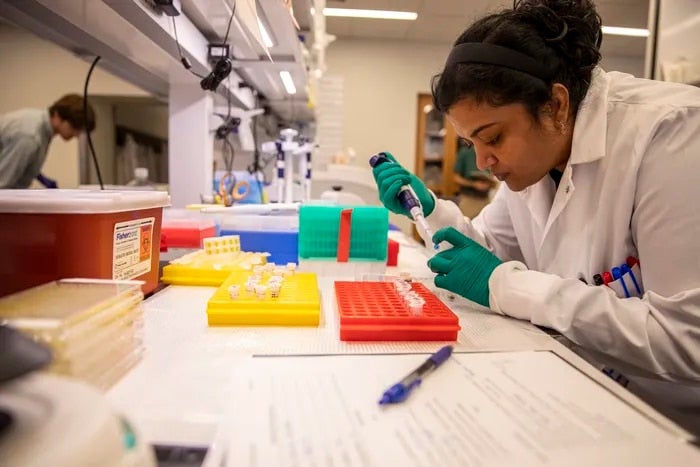Drew Weismann, M.D., Ph.D., who is known for co-inventing the mRNA technology that enabled the rapid development of highly effective COVID-19 vaccines with his colleague Katalin Karikó at Penn, is now working on vaccines to protect against all coronaviruses.
The first COVID vaccines taught the immune system to recognize, and make antibodies against, the coronavirus spikes, the dozens of tiny proteins that stick out from the surface of each virus particle.
The virus uses these spikes like a lock pick, breaking through the membranes of cells. However, in someone who’s been vaccinated, antibodies latch onto this lock pick so that it no longer fits a certain receptor on the cell’s exterior, which is like a keyhole.
In the early rush to develop a vaccine, scientists reasoned that this was enough and that there was no need to teach the immune system about the rest of the virus if the spike couldn’t enter the cells.
Unfortunately, with the rise of the delta variant, followed by omicron, the coronavirus spike picked up a series of shape-shifting mutations that allowed it to not only avoid recognition by the antibodies, but also still fit the “lock” well enough to enter the cell.
This is why the Weissman Lab is working on developing next-generation vaccines that can target multiple COVID variants — and multiple types of coronaviruses. To do so, researchers are injecting mice with virus-like particles that contain both a spike and other structural proteins.
The idea is that while the spike may change its shape and retain the ability to penetrate a cell, the other proteins appear to be similar across multiple COVID variants and multiple types of coronaviruses. If the immune system can recognize these shared proteins, it should be prepared to ward off a variety of threats.
So far in the Weissman Lab, the mice injected with the virus-like particle have generated antibodies that match both the original COVID as well as its omicron variant, which shows promise.
If all goes well, an early-stage trial in humans could happen as soon as early next year, funded in part by the Coalition for Epidemic Preparedness Innovations (CEPI), a nonprofit foundation based in Oslo.
Weissman is involved in three other broad-spectrum coronavirus vaccines with different strategies, including collaborations with scientists at Duke University, the University of North Carolina, and Los Alamos National Laboratory, all of which are showing early signs of success.
To learn more about this research, read the full Philadelphia Inquirer article here.
